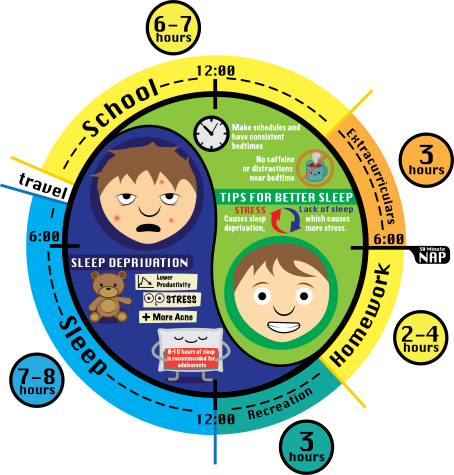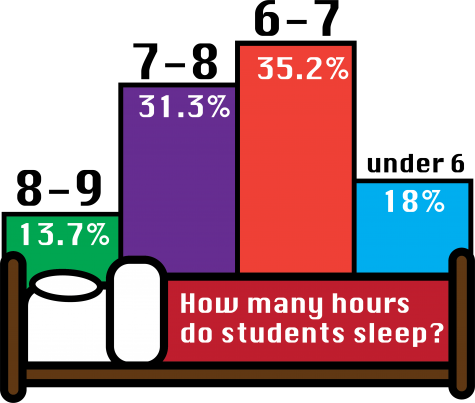Harmful Effects of Sleep Deprivation
For many students at Cupertino, sleep is an elusive and rare commodity, with the September Student Health and Wellness Survey finding that only 47% of surveyed Tino students get more than seven hours of sleep per night. These numbers are in striking contrast to research that suggests adolescents should get at least eight to ten hours per night for a healthy lifestyle.
Most teens can feel the immediate consequences of running on three or four hours of sleep, but few know the detrimental consequences that can arise out of consistently neglecting it. When students fall into a pattern of six to seven hours of sleep per night, productivity, concentration, and energy deteriorate in comparison to normal. Inversely, lack of sleep causes teens to experience higher stress and suffer from more acne. As time passes, overburdened students begin to lose awareness of common symptoms like irritability and fatigue. This results in habits of staying up late that are challenging to break. While teens may be inclined to “fix” the problem by sleeping in over the weekend, studies show that this further throws off our biological clocks.

The issue is that students at Cupertino tend to overload themselves with work and challenging classes, and the time dedicated to these things is siphoned from our sleep schedules. Roughly 65% of the surveyed students spend over 2 hours per day on homework, and 12% spend over 4 hours on it. In addition, 84% of students claimed to be involved in at least one extracurricular activity. The difficulty of managing time increases with the grade levels as students take on advanced courses, athletics, and leadership positions in clubs. This makes sleep a difficult topic to tackle since teens are unwilling to sacrifice what is perceived to be productivity for some extra hours in bed.
Another challenging aspect is that during adolescence, biological clocks are naturally adjusted so that teens stay up later and are inclined to remain sleepy until midday. This change means that school puts teenagers at an inherent disadvantage with early start times. Strangely, students were asked in the September survey about the possibility of shifting start times in the next school year and responded with minimal enthusiasm. Roughly 43% of 9-11th graders doubted the efficacy of this approach and 25% were neutral on the topic.
Over the past few years, Ms. Tomberlain and the school staff have worked to minimize sleep problems by making changes to curriculum and reducing homework across the board. In comparison to last year, 7% more students get at least 7 hours of sleep and 8% fewer students are spending more than 4 hours on homework. While they continue to streamline academic time demands, the core problem of fatigue and stress in students remains.
Students can make small modifications to their lifestyle to battle sleep deprivation. For example, a 30-minute power nap in the afternoon can boost productivity for the rest of the day. In addition, professionals recommend establishing a consistent schedule of sleep to which the body can adjust. This means teens should avoid sleeping in on weekends and monitor time carefully. Another tip is to avoid electronic distractions and energy food like caffeine as bedtime approaches. Most importantly, students must maintain focus and make good use of time throughout the day.




